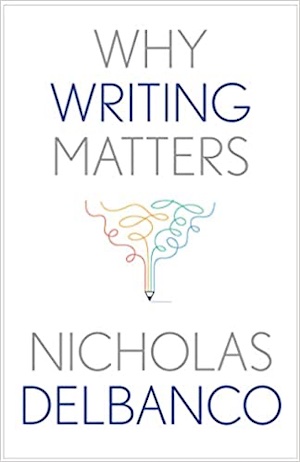By David Madden
Page after page, what a rich, well-stirred, simmering stew-pot of words and phrases, wit and wisdom, compulsive puns, declarations and qualifiers, avowals and disavowals, tributes and demurs, names of writers and novels, delightful profusion of literary allusions, and so on and so forth, in the best sense of that phrase, Nicholas Delbanco is serving us in his complex and loving answer to the urgent question, Why Writing Matters.
The author of 20 works of fiction, the latest of which is The Years (2015), and nonfiction, the latest of which is, appropriately, Curiouser and Curiouser (2017), Delbanco was co-creator of the writing program at Bennington and has taught at other major universities. In a sense, all his works are about reading and writing, readers and writers.
One of his most interesting books on writing is The Lost Suitcase: Reflections on the Literary Life (2000). He conveys ways in which writers interact with each other, not so much in groups as in webs of contact in Group Portrait: Conrad, Crane, Ford, James, & Wells (1990).
Delbanco’s many fine qualities as teacher, reader, and writer are generously, gracefully, playfully at work in Why Writing
Matters—to readers, I am eager to add. At 78, he seems determined to avoid retiring by continuing to do what he has been doing since young manhood.
The shifting framework of this book is the teaching of writing in university workshops. Out of his experiences, Delbanco passes on many illustrative passages from student work and his own imagination and writing exercises more excellent than most I have seen, along with anecdotes about James Joyce, Samuel Beckett, Eudora Welty, Toni Morrison, Camus, Virginia Woolf that illustrate literary concepts. He regrets that the fine, once celebrated writers John Gardner and John Updike are rare in the minds of new readers and writers, while he is happy to assure his readers that James Baldwin’s works are deservedly very much alive.
Delbanco advises his workshop students to “leave ego at the door.” But readers should be grateful for the ego required to write this strange, hybrid book.
His ideal reader is perhaps less students presently engaged as with writers almost as experienced as he, reviewing with him as much of their literary lives as he is.
As for Delbanco’s literary legacy, The New York Times testified fifty years ago that “if we neglect him, we shall have to apologize to posterity.”
David Madden (ΦBK, University of Tennessee) is the author of The Voice of James M. Cain: An Innovative Biography (2020), and 11 novels, 4 collections of stories, many poems, plays, literary studies. It All Came together in Paris is a novel in progress.




